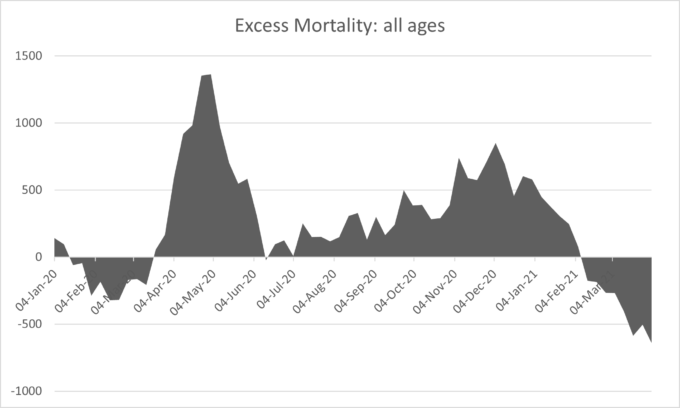Why are deaths now significantly fewer than normal?
According to a release from Statistics Canada.
from the end of March 2020 to the beginning of April 2021, an estimated 62,203 deaths were reported among Canadians aged 0 to 64. This represents 5,535 more deaths than expected were there no pandemic, after accounting for changes in the population such as aging. Over the same period, 1,380 COVID-19 deaths have been attributed to the same age group (those younger than 65), suggesting that the excess mortality is, in large part, related to other factors such as increases in the number deaths attributed to causes associated with substance use and misuse, including unintentional (accidental) poisonings and diseases and conditions related to alcohol consumption.
Statistics Canada. Table 13-10-0792-01 Adjusted estimates of excess mortality, all ages, all sexes by week.
Statistics Canada does not comment on the many fewer than expected deaths in the last part of the period. Could it be that some of the earlier deaths were people who would have died a natural death a few months later? Or perhaps wearing masks, social distancing and less travel has a protective effect beyond that for COVID-19? It seems doubtful it’s the result of vaccination as mortality transitioned from more to fewer than normal deaths for all age groups in February, at the beginning of the month for the oldest cohort and the end of the month for the youngest.



And to think that there are still some people who do not want to be vaccinated….. Incredible !!!
Take good care and Stay safe !
JH
The phenomenon of excess deaths followed by less deaths than expected is known as “mortality displacement” or more colloquially “harvesting effect”. This is often seen in heatwaves. But is also possible that a genuine reduction has occurred. In New Zealand where I am, we had fewer deaths than usual in 2020. The number of lives saved on the road during lockdown alone cancelled out the deaths due to COVID, and we had virtually no ‘flu following the lockdown, which ended in late Autumn.